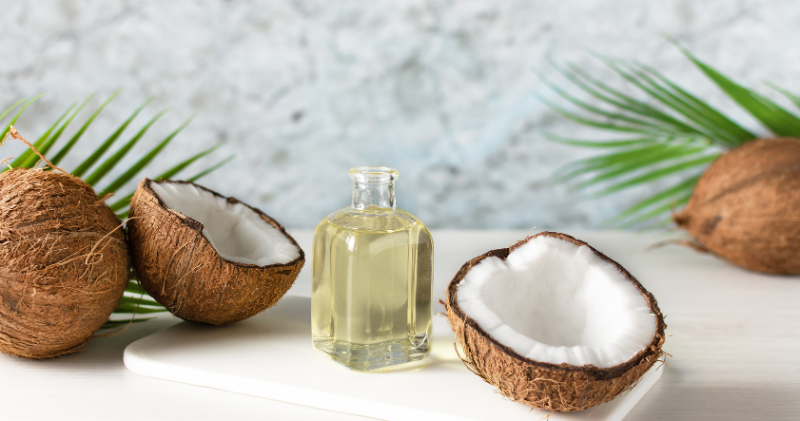Is Your Coconut Use Raising Your Cholesterol?
Walk through any home in Kerala or Sri Lanka, and you’ll smell it in the air. That rich, sweet smell of coconut oil heating in a clay pot, ready to cook the evening curry. For generations, coconut oil has been more than just cooking fat in these coastal regions. It’s been medicine, beauty treatment, and cultural identity all melted into one golden liquid.
But today, families who grew up with this ancient tradition face a modern dilemma. The same Kerala that celebrates coconut oil also has India’s highest rates of heart disease and cholesterol. Sri Lanka, where 80% of cooking fat comes from coconut, struggles with similar heart problems.
Is this a coincidence? Or could the oil that nourished our grandparents actually be harming our hearts today?
As someone whose family roots run deep in Kerala soil, this isn’t an easy question to explore. But with heart disease striking South Asians earlier and more severely than any other population, we need honest answers about the foods we love most.
Let’s look at what science really tells us about coconut oil and heart health—without fear, without bias, and with respect for both tradition and truth.
The Balanced Truth About Coconut Oil
Who Should Be Cautious?
You should be especially careful with coconut oil if you have:
- High LDL cholesterol (above 130 mg/dL)
- Family history of early heart disease
- Diabetes or insulin resistance
- Already elevated triglycerides
Practical Recommendations: Finding Balance
The goal isn’t to eliminate coconut from South Asian cuisine—that’s neither realistic nor necessary. Instead, aim for mindful moderation:
Smart Coconut Oil Use
- Cooking amount: Limit to 1-2 teaspoons per person per meal, not tablespoons.
- Choose quality: Use virgin, unprocessed coconut oil rather than refined versions.
- Balance with other oils: Rotate between coconut oil, mustard oil, olive oil, and rice bran oil.
- Count total coconut: Remember that coconut milk and fresh coconut also contribute saturated fat.
Better Cooking Oil Alternatives
- Mustard oil: High in omega-3s, traditional in Bengali and North Indian cooking.
- Rice bran oil: High smoke point, neutral taste, contains compounds that may lower cholesterol.
- Olive oil: Best for low-heat cooking and salads, proven heart benefits.
- Sunflower oil: Good for high-heat cooking, neutral flavor.
- Avocado oil: High smoke point, heart-healthy fats.
Traditional Wisdom Meets Modern Science
- Use coconut oil for special occasions: Save it for festival foods and traditional dishes rather than daily cooking.
- Maintain the cultural connection: Continue using coconut oil for hair and skin care, where it has proven benefits.
- Focus on overall diet: One oil won’t make or break your heart health. The total pattern of eating matters more.
- Stay active: Traditional coconut-eating populations were also much more physically active.
Know Your Numbers
Rather than guessing about coconut oil’s effects on your body, get tested:
Essential Tests for South Asians
- Complete lipid panel: Include total cholesterol, LDL, HDL, and triglycerides.
- ApoB: This measures the actual number of harmful cholesterol particles and is more accurate for South Asians than LDL alone.
- Lp(a): A genetic cholesterol factor that affects up to 30% of South Asians.
- HbA1c: Shows average blood sugar over 3 months; important since diabetes and heart disease often go together.
Testing Timeline
- Age 25-35: Get baseline numbers, especially with family history
- Age 35+: Test every 1-2 years
- After dietary changes: Retest in 3-6 months to see how your body responds
If your numbers are good and stable, moderate coconut oil use may be fine for you. If they’re elevated, it’s time to reduce saturated fats from all sources.
The Bottom Line: Respect Both Science and Culture
Coconut oil isn’t poison, but it’s also not a miracle cure. It’s a traditional fat with both benefits and risks that need to be weighed against your individual health profile.
For healthy people with good cholesterol levels: Moderate coconut oil use as part of a balanced diet is likely fine.
For people with heart disease risk factors: Focus on unsaturated oils for daily cooking while keeping coconut oil for special occasions.
For everyone: Don’t let coconut oil be your only fat source, and remember that total coconut consumption (oil, milk, and meat) adds up.
The real lesson from Kerala might not be about coconut oil specifically, but about balance. Our ancestors used coconut oil in smaller amounts, balanced it with plenty of vegetables and fish, and were far more physically active. They didn’t eat out frequently or consume processed foods.
The question isn’t whether to completely avoid a food that’s been part of our culture for centuries. It’s how to enjoy it wisely in the context of modern life and modern health challenges.
Your heart doesn’t care about food traditions—but your happiness and cultural identity matter too. Find the balance that honors both your heritage and your health.
Coconut Oil: Pros & Cons Summary
Potential Benefits
- Better than butter or trans fats: for heart health
- Raises HDL (good) cholesterol
- Contains some beneficial MCTs: for quick energy
- Culturally important and locally sustainable
- Good for cooking: at high temperatures
- Proven benefits: for hair and skin care
Potential Concerns
- Can raise LDL (bad) cholesterol: in many people
- Not superior to unsaturated oils: like olive or mustard oil
- High in calories: (120 per tablespoon)
- May contribute: to Kerala’s high heart disease rates
- Only 10-15% is beneficial MCTs
- Lacks essential fatty acids: found in other oils
Smart Alternatives for Daily Cooking
- Mustard oil: Traditional, high in omega-3s
- Rice bran oil: High smoke point, cholesterol-lowering compounds
- Olive oil: Proven heart benefits, best for low-heat cooking
- Sunflower oil: Heart-healthy, neutral taste
- Avocado oil: High smoke point, beneficial fats
Get These Tests
- Complete lipid panel (LDL, HDL, triglycerides)
- ApoB levels (more accurate than LDL for South Asians)
- Lp(a) genetic cholesterol factor
- HbA1c for diabetes risk
Remember: Your body’s response to coconut oil is individual. Test your numbers, not your assumptions.
References:




